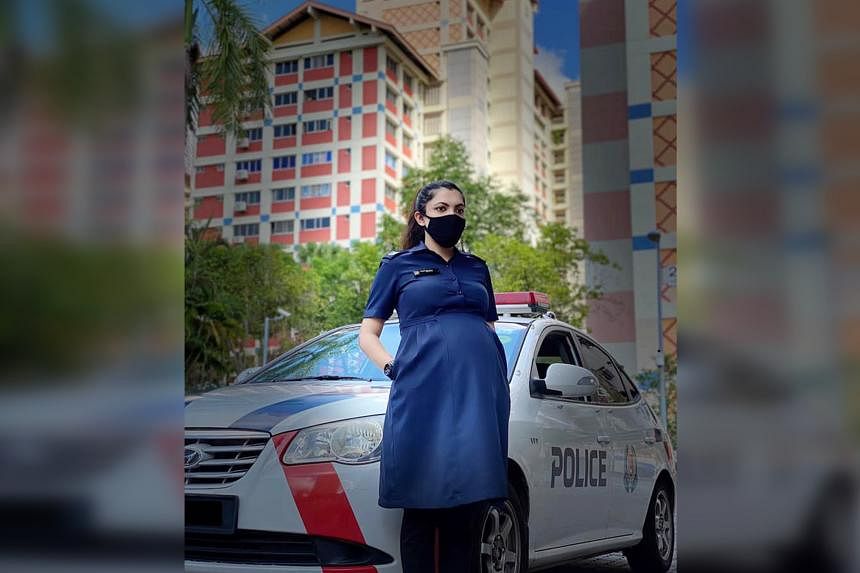- Joined
- Sep 12, 2019
- Messages
- 7,986
- Points
- 113
I thought u like ang mo. Ang mo is the one started this term. Nobody is polite in this forum.I think the norm now in this forum is shit skin whoch is not very polite.
I thought u like ang mo. Ang mo is the one started this term. Nobody is polite in this forum.I think the norm now in this forum is shit skin whoch is not very polite.






Can give your opinions on race as long as it is not offensive.
S'pore's approach in prohibiting offensive speech but not sharing of opinions on race, protects minorities: Shanmugam

The approach gives greater protection for minorities by making it safe for them to speak about their experiences, said Home Affairs and Law Minister K. Shanmugam.PHOTO: ST FILE

Hariz Baharudin
JUL 5, 2021
SINGAPORE - Singapore's approach, in strictly prohibiting offensive speech on race, but not the sharing of opinions on these matters, gives greater protection for minorities by making it safe for them to speak about their experiences, said Home Affairs and Law Minister K. Shanmugam on Monday (July 5).
He added that if racially offensive speech by all is tolerated or allowed, it can be expected that more of such speech will be directed towards minority communities, who will then bear the brunt of it.
Mr Shanmugam was replying to Ms Raeesah Khan (Sengkang GRC), who had asked if laws against racist hate speech here are consistent with recommendations by the United Nations that state how measures to combat racist speech should not be used as a pretext to curtail expressions of protest.
Singapore's laws against racist hate and offensive speech are consistent with these recommendations, said the minister.
He said that under the Penal Code, it is an offence to commit acts that deliberately wound the racial feelings of any person, promote enmity between different racial groups, or conduct acts that are prejudicial to the maintenance of racial harmony.
"These laws apply equally to everyone, regardless of race," said Mr Shanmugam. He shared two incidents when such laws were used.
In the first, in January 2019, a Chinese man was charged under the Penal Code for deliberately intending to wound the racial feelings of the Malay population. The man had scrawled racist messages about Malays on walls in void decks and sheltered walkways in Geylang and Aljunied.
In the second, in June 2020, a Malay man who used a Twitter account with a Chinese name "@sharonliew86" to make racist remarks against people of different races was similarly charged.
While noting that a significant amount of discussion, commentary and sharing of experiences on race takes place, Mr Shanmugam said that Singapore takes a strict approach to offensive speech and hate speech.
This approach applies equally to all, regardless of majority or minority, which he said gives greater protection for minorities by making it safe for them to speak about their experiences, and to give their views.
Should racially offensive speech be tolerated or allowed, more of such speech will likely be directed towards minority communities, added Mr Shanmugam.
"That will ironically reduce the safe space for discussion of such issues, and increase minority community concerns for safety and security. These are not hypotheticals. This is what has happened in several other countries," he said.
"We need to be careful about changing what has worked reasonably well in Singapore (though it is not perfect), and replacing it with policies which have not worked so well, in other places."
In his reply, Mr Shanmugam also noted that the UN recommendations have similarly taken the view that the protection of people from racist hate speech is not incompatible and is not "simply one of opposition" against the freedom of expression.
The minister added that is not clear in Ms Raeesah's question if she is suggesting that whenever anyone claims to be protesting against "injustice, expressing social discontent, or speaking in opposition", they should be exempted from the Penal Code and be allowed to engage in hate or offensive speech.
The Ministry of Home Affairs has invited her to clarify this, said Mr Shanmugam.
From china too.Why are Indians detested?
Because of the culture in India that they came from.
A culture of cheating and lying which they bring over when they come to Singapore.
Cheating and lying manifested in fake education credentials, fake covid-19 test results, fake vaccination certificates.
A culture of self-centeredness and every man for himself.
An ethnocentric and clannish culture in which an Indian will hire his fellow Indian from his village, his home town.
A caste system that perpetuates class discrimination and gives rise to elites with a displaced sense of entitlement.
Which they bring over when they come to Singapore: they think they are better than the locals and talk down to them.
This culture and behaviour are incongruous with the culture and values in Singapore.
Singapore has prospered because of a culture of integrity, honesty, good manners and community spirit assimilated from the colonial British.
Can't blame Singaporeans when the behaviour of Indians rankle them.
And do not brand Singaporeans' reactions and responses towards Indians as racist in nature.
It is not racism. It is a dislike, and every person is entitled to his likes and dislikes.
I don't think so. Its just that their administrators saw this coming and they are ahead but others have caught up. Plus they are cheaper to hire.Indians are better at IT no doubt.
Indians are better at IT no doubt.








Lie and cheat only'This is my life, this is my reputation': Zilingo's ex-CEO Ankiti Bose speaks out after her firing

Choo Yun Ting
Business Correspondent
MAY 28, 2022
SINGAPORE - A week after she was fired from fashion e-commerce platform Zilingo, co-founder and former chief executive Ankiti Bose continues to refer to it as her "baby".
"Not a day in the last six and a half, almost seven, years has been a holiday. It's been, you know, all about this baby. Mine," she said.
"So it's been incredibly hard, and I don't know if I'm going to get all the answers."
In an interview with The Straits Times last Thursday (May 26), Ms Bose spoke of her sense of loss after being kicked out of the company she started, and how she wanted to find answers.
On March 31, the 30-year-old was suspended from her duties at Zilingo after shareholders and the company's board received complaints of alleged financial irregularities.
On May 20, Zilingo said she had been fired following an investigation into the complaints and that it "reserves the right to pursue appropriate legal action".
The start-up was co-founded in 2015 by Ms Bose and Mr Dhruv Kapoor, the company's chief technology and product officer, and attracted investors such as Sequoia Capital India, Burda Principal Investments and Singapore state investor Temasek.
Over the years, the young, eloquent Ms Bose became the face of Zilingo, appearing at global conferences alongside established industry peers. She was featured in Fortune's 40 Under 40 in 2019 and, together with Mr Kapoor, made Forbes Asia's 30 Under 30 list in 2018.
In a 90-minute interview at her apartment in central Singapore, she appeared confident as she talked about her desire to defend her reputation and how she was determined to communicate with the company's stakeholders.
On her sacking, which she found out via an e-mail sent to her from the company, she said it came as a surprise.
"I was keen to have more conversations and provide more explanation... about what was going on," she said.
Ms Bose, an Indian national and a Singapore permanent resident, said she has yet to see the report from the investigations commissioned by Zilingo to look into claims of financial irregularities.
Her termination letter also cited "insubordination" as one of the reasons for her firing, she said.
"I have still not seen the report used to terminate me or had a chance to contest it," she said.
She added that she has been spending time trying to speak with shareholders and ex-colleagues to understand what is going on with the company.
Ms Bose said she has not been allowed to speak with shareholders, whom she said she was "very, very close to", over the past two months. Her recent communications with the company and its board have largely been through legal representatives.
"People keep asking me, why are you fighting so hard to find answers? But you know, I just turned 30, this is my life, this is my reputation. This is everything to me. It means more than anything else for me to speak to my shareholders and my stakeholders and my employees, to understand what has happened and explain my position."
She added: "I think it's important that we also think in a way that is constructive and reconciliatory between stakeholders so that we might do what's good for the company and its hundreds of employees. I don't know if that's possible, but I hope so."
An only child, Ms Bose grew up in Mumbai, where she attended RN Podar School, a private secondary school, and St Xavier's College, a private autonomous higher education institution, where she studied economics.
She started her career at consultancy firm McKinsey & Co in Mumbai before moving to Sequoia Capital's office in Bangalore. She left the venture capital company to start Zilingo with Mr Kapoor.
She has been living in Singapore for the past four years and her parents are currently living with her in her rented apartment, a spacious unit with furnishings in neutral tones of white, grey and brown. She declined to have her home photographed.
In an Instagram post last Friday, Ms Bose said she had to deal with hate messages and threats of violence, and that her personal photos and other documents may have been improperly accessed and circulated on the Internet.
She told ST she barely left her apartment during the period she was suspended other than to take occasional walks. She spoke to her lawyers mostly through video-conferencing or e-mail.
"I've barely slept in the last two months," she added.
Asked about the alleged financial irregularities surrounding Zilingo, she said the pandemic was a tough period for the start-up and it had to take the difficult decision to restructure some of its teams.
She had been aware there were delays in its financial reporting. Regulatory checks show the start-up last filed financial statements for 2019.
Zilingo had a finance team of over 20 people as well as a Big Four firm auditor and Big Four adviser, she said.
"While I was still CEO, we were waiting for the proper advice from them on how to take things forward," she said. "I couldn't touch the accounts since I'm not a qualified chartered accountant."

Zilingo co-founder and former chief executive Ankiti Bose spoke of her sense of loss after being kicked out of the company she started, and how she wanted to find answers. ST PHOTO: FELINE LIM
She said it is common for many start-ups to be late in filing their accounts and it was a particular struggle in 2020 and 2021 given the pandemic, but "it's not an excuse".
She said she is in the dark about where the company is headed, but she meanwhile retains an 8 per cent stake in the firm, the same as Mr Kapoor.
Asked what her next steps are, she said: "I think I would love to still see what is the best thing that can be done for the company in this current situation."
Hundreds of people have spent countless sleepless nights to build the company, she said.
"I want to be positive, but I think it's important for me to find out what happened and try to help... to steer the ship forward," she said.
An emotional Bollywood movie scene.


As a mCan give your opinions on race as long as it is not offensive.
S'pore's approach in prohibiting offensive speech but not sharing of opinions on race, protects minorities: Shanmugam

The approach gives greater protection for minorities by making it safe for them to speak about their experiences, said Home Affairs and Law Minister K. Shanmugam.PHOTO: ST FILE

Hariz Baharudin
JUL 5, 2021
SINGAPORE - Singapore's approach, in strictly prohibiting offensive speech on race, but not the sharing of opinions on these matters, gives greater protection for minorities by making it safe for them to speak about their experiences, said Home Affairs and Law Minister K. Shanmugam on Monday (July 5).
He added that if racially offensive speech by all is tolerated or allowed, it can be expected that more of such speech will be directed towards minority communities, who will then bear the brunt of it.
Mr Shanmugam was replying to Ms Raeesah Khan (Sengkang GRC), who had asked if laws against racist hate speech here are consistent with recommendations by the United Nations that state how measures to combat racist speech should not be used as a pretext to curtail expressions of protest.
Singapore's laws against racist hate and offensive speech are consistent with these recommendations, said the minister.
He said that under the Penal Code, it is an offence to commit acts that deliberately wound the racial feelings of any person, promote enmity between different racial groups, or conduct acts that are prejudicial to the maintenance of racial harmony.
"These laws apply equally to everyone, regardless of race," said Mr Shanmugam. He shared two incidents when such laws were used.
In the first, in January 2019, a Chinese man was charged under the Penal Code for deliberately intending to wound the racial feelings of the Malay population. The man had scrawled racist messages about Malays on walls in void decks and sheltered walkways in Geylang and Aljunied.
In the second, in June 2020, a Malay man who used a Twitter account with a Chinese name "@sharonliew86" to make racist remarks against people of different races was similarly charged.
While noting that a significant amount of discussion, commentary and sharing of experiences on race takes place, Mr Shanmugam said that Singapore takes a strict approach to offensive speech and hate speech.
This approach applies equally to all, regardless of majority or minority, which he said gives greater protection for minorities by making it safe for them to speak about their experiences, and to give their views.
Should racially offensive speech be tolerated or allowed, more of such speech will likely be directed towards minority communities, added Mr Shanmugam.
"That will ironically reduce the safe space for discussion of such issues, and increase minority community concerns for safety and security. These are not hypotheticals. This is what has happened in several other countries," he said.
"We need to be careful about changing what has worked reasonably well in Singapore (though it is not perfect), and replacing it with policies which have not worked so well, in other places."
In his reply, Mr Shanmugam also noted that the UN recommendations have similarly taken the view that the protection of people from racist hate speech is not incompatible and is not "simply one of opposition" against the freedom of expression.
The minister added that is not clear in Ms Raeesah's question if she is suggesting that whenever anyone claims to be protesting against "injustice, expressing social discontent, or speaking in opposition", they should be exempted from the Penal Code and be allowed to engage in hate or offensive speech.
The Ministry of Home Affairs has invited her to clarify this, said Mr Shanmugam.
As a minority, I welcome critism and honest pointing out the flaws in my community, as we can correct perceptions and improve, instead of hiding and sweeping it under the carpetCan give your opinions on race as long as it is not offensive.
S'pore's approach in prohibiting offensive speech but not sharing of opinions on race, protects minorities: Shanmugam

The approach gives greater protection for minorities by making it safe for them to speak about their experiences, said Home Affairs and Law Minister K. Shanmugam.PHOTO: ST FILE

Hariz Baharudin
JUL 5, 2021
SINGAPORE - Singapore's approach, in strictly prohibiting offensive speech on race, but not the sharing of opinions on these matters, gives greater protection for minorities by making it safe for them to speak about their experiences, said Home Affairs and Law Minister K. Shanmugam on Monday (July 5).
He added that if racially offensive speech by all is tolerated or allowed, it can be expected that more of such speech will be directed towards minority communities, who will then bear the brunt of it.
Mr Shanmugam was replying to Ms Raeesah Khan (Sengkang GRC), who had asked if laws against racist hate speech here are consistent with recommendations by the United Nations that state how measures to combat racist speech should not be used as a pretext to curtail expressions of protest.
Singapore's laws against racist hate and offensive speech are consistent with these recommendations, said the minister.
He said that under the Penal Code, it is an offence to commit acts that deliberately wound the racial feelings of any person, promote enmity between different racial groups, or conduct acts that are prejudicial to the maintenance of racial harmony.
"These laws apply equally to everyone, regardless of race," said Mr Shanmugam. He shared two incidents when such laws were used.
In the first, in January 2019, a Chinese man was charged under the Penal Code for deliberately intending to wound the racial feelings of the Malay population. The man had scrawled racist messages about Malays on walls in void decks and sheltered walkways in Geylang and Aljunied.
In the second, in June 2020, a Malay man who used a Twitter account with a Chinese name "@sharonliew86" to make racist remarks against people of different races was similarly charged.
While noting that a significant amount of discussion, commentary and sharing of experiences on race takes place, Mr Shanmugam said that Singapore takes a strict approach to offensive speech and hate speech.
This approach applies equally to all, regardless of majority or minority, which he said gives greater protection for minorities by making it safe for them to speak about their experiences, and to give their views.
Should racially offensive speech be tolerated or allowed, more of such speech will likely be directed towards minority communities, added Mr Shanmugam.
"That will ironically reduce the safe space for discussion of such issues, and increase minority community concerns for safety and security. These are not hypotheticals. This is what has happened in several other countries," he said.
"We need to be careful about changing what has worked reasonably well in Singapore (though it is not perfect), and replacing it with policies which have not worked so well, in other places."
In his reply, Mr Shanmugam also noted that the UN recommendations have similarly taken the view that the protection of people from racist hate speech is not incompatible and is not "simply one of opposition" against the freedom of expression.
The minister added that is not clear in Ms Raeesah's question if she is suggesting that whenever anyone claims to be protesting against "injustice, expressing social discontent, or speaking in opposition", they should be exempted from the Penal Code and be allowed to engage in hate or offensive speech.
The Ministry of Home Affairs has invited her to clarify this, said Mr Shanmugam.
